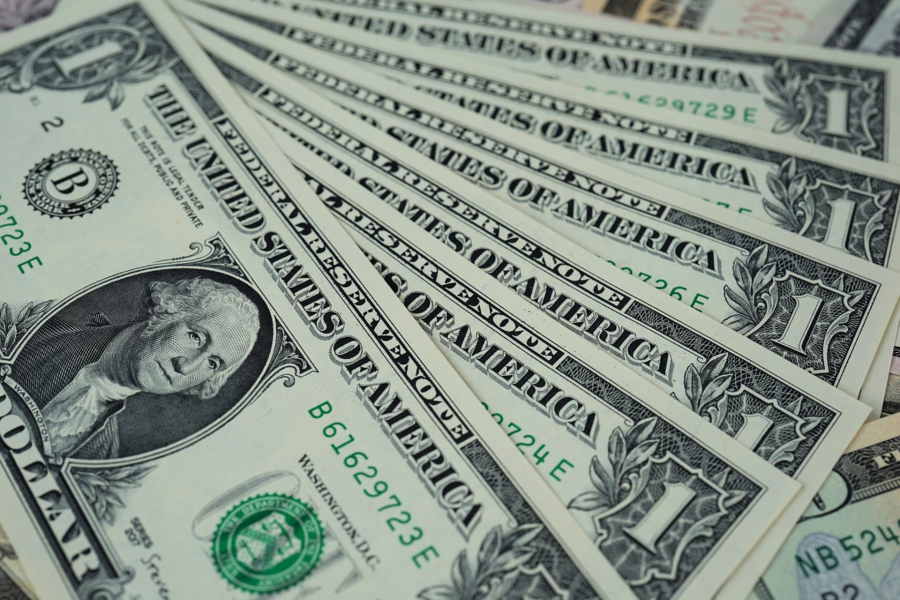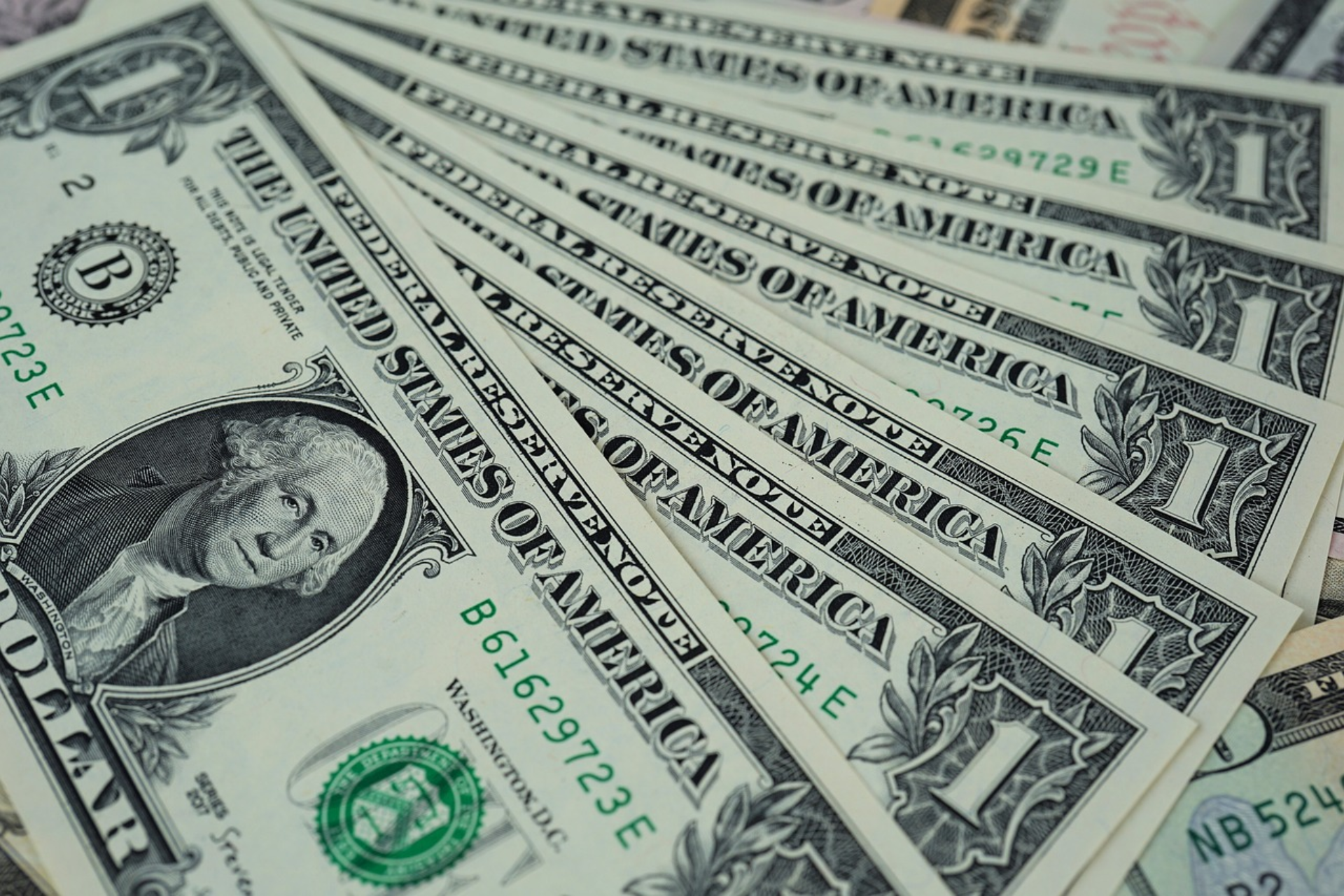
Dollar set for weekly loss as key jobs data looms
The dollar Dollar set for weekly loss after being on course to snap a six-week winning streak against major peers on Friday, as it headed into a pivotal monthly U.S. jobs report.

Reuters: The dollar Dollar set for weekly loss after being on course to snap a six-week winning streak against major peers on Friday, as it headed into a pivotal monthly U.S. jobs report that is likely to inform the path for Federal Reserve policy over the near term.
U.S. DOLLAR SET FOR WEEKLY LOSS
The U.S. currency dipped to a one-week low against the yen, weighed down by slumping Treasury yields, after a volatile week when overall soft economic data tempered the outlook for further Fed rate hikes. However, the greenback held on to gains made against the euro and sterling overnight after officials at the respective central banks struck more dovish postures ahead of policy meetings this month. Elsewhere, the yuan strengthened after the People’s Bank of China cut forex reserve requirements for the first time in a year.
The U.S. dollar index – which measures the currency against a basket of six developed-market peers, including the euro, sterling and yen – edged 0.02% lower to 103.61 on Friday, bringing declines this week to 0.53%. A parade of employment and inflation data has paved the way to the nonfarm payrolls report later in the global day, and much of it has been on the weaker side, leading traders to pare bets for a rate hike on Sept. 20 to 12% from 18% a week ago, according to the CME Group’s FedWatch tool.
ALSO READ: Who is the richest person in the world today? Top 10 list – 1 September 2023
“The dollar rally is looking quite tired, with outsized falls in response to what are normally second-tier data releases, raising the danger of a dramatic fall if the first-tier payrolls number is soft,” said Sean Callow, a senior currency strategist at Westpac. For the dollar index, “a weekly close below 103.00 seems assured in that case,” he said. Two-year Treasury yields, which are particularly sensitive to rate expectations, have declined about 20 basis points this week to 4.86%, the biggest slide since mid-March. That has helped push the dollar down against the yen . It slipped 0.03% to 145.485 yen on Friday, putting its loss for the week at 0.65%.
The dollar made up some ground on the euro overnight though. The single currency was little changed at $1.0846 following a 0.74% tumble on Thursday that pared its weekly advance to 0.49%. European Central Bank board member Isabel Schnabel, a noted policy hawk, said that euro-region growth is weaker than predicted just a few months ago, although she added that rates could still rise further. ECB Vice-President Luis de Guindos said separately that the central bank is nearing the end of its hiking cycle.
Euro-area data on Thursday showed core inflation fell in August. Expectations for an “upside surprise” had been building after German inflation outpaced forecasts in a reading on Wednesday, said Ray Attrill, head of foreign-exchange strategy at National Australia Bank. “There’s a little bit of relief there, which had an impact in just dampening expectations for a September ECB hike,” he said. “That’s basically what took the bite out of the euro.”
ALSO READ: NASA plans to launch a new supersonic plane
Also on Thursday, Bank of England chief economist Huw Pill highlighted the risk that policy tightening will hurt Britain’s economy, even as he said the central bank will “see the job through” on bringing inflation back to target. “Pill’s comments appear consistent with another quarter-point turn of the screw on 21 September, but not necessarily thereafter,” Attrill said.
In Asia, the early focus turned to the yuan, which jumped to the highest since Aug. 11 at 7.2392 per dollar in offshore trading , before paring most of those gains. The dollar was last 0.12% weaker at 7.2670 yuan. The People’s Bank of China said it would cut the foreign exchange reserve requirement ratio by 200 basis points to 4% beginning Sept. 15, according to an online statement, as it expanded efforts to shore up its embattled currency, which sank to an 11-month trough at 7.3426 in mid-August.
In cryptocurrencies, bitcoin unwound all of its gains for the week, last trading at $26,033 after dropping 5% overnight as the Securities and Exchange Commission delayed a decision on whether to approve several applications for spot bitcoin ETFs. Bitcoin had jumped as high as $28,142 on Tuesday after a U.S. court ruled that the SEC was wrong to reject an application from Grayscale Investments to create such an ETF, which would be the first of its kind.
ALSO READ: Lights, CAMERA, action: BODYCAMS go live in Cape Town
BRITISH POUND
Reuters: The pound firmed against the euro on Thursday as euro zone data showed core inflation slowing, while the Bank of England’s chief economist said British interest rates should probably stay high to quash “stubbornly high” core inflation. The euro was last down 0.19% at 85.71 pence, broadly in the middle of its recent range. Euro zone inflation held steady this month, Thursday data showed, but underlying price growth fell as expected, causing money markets to cut expectations for an ECB rate hike in September. They are now pricing in a 30% chance of a 25 basis point hike in September, according to LSEG data, compared with a 60% chance expected a day earlier.
Meanwhile BoE Chief Economist Huw Pill said on Thursday that the central bank would “see the job through” on bringing high inflation back down to its 2% target, even if there was a risk that high interest rates hurt Britain’s economy. Investors see an 80% chance that the BoE will raise interest rates to 5.5% next month, and expect rates to peak at 5.75% before the end of the year.
The pound dipped against the dollar, down 0.28% to $1.2673, but held up better than most major currencies, as the greenback firmed across the board, regaining some ground after three sessions of losses at the start of the week. Sterling is one of the best performing major currencies against the dollar this year, having been supported by expectations that the Bank of England will keep raising rates longer than most peers and British economic data coming in better than had been feared at the start of the year.
ALSO READ: Russian medical graduates to march against alleged government incompetence
Now, however, several analysts think its period of overperformance is coming to an end. “I’m not quite sure what can make the pound go up against the euro from here, and the only thing that makes it go up against the dollar is that the world is now too pessimistic about Europe and too optimistic about the U.S.” said Kit Juckes, head of FX strategy at Societe Generale. “We’re at the point where bad rate rises don’t help currencies – though that’s true of the ECB and Bank of England – and, because we are maniacally data sensitive at the moment and people have built up a big long position in sterling, one piece of bad data for the UK or good data for somewhere else could move those crosses around.”
SOUTH AFRICAN RAND
Reuters: South Africa’s rand weakened on Thursday against a stronger dollar as data painted a mixed picture of the U.S. economy. At 1544 GMT, the rand traded at 18.9300 against the dollar, nearly 1.3% weaker from its previous close. South Africa’s July producer inflation and trade figures did little to prop up its currency, with the rand taking cues from the stronger dollar.
South Africa recorded a trade surplus of 15.96 billion rand ($849.53 million) in July, revenue service figures showed, while the statistics agency said the country’s producer inflation slowed to 2.7% year on year in July from 4.8% in June. The dollar index was last up nearly 0.6% against a basket of other major currencies. U.S. consumer spending accelerated in July with an 0.8% increase, but slowing inflation fueled expectations that the Federal Reserve would leave interest rates unchanged next month.
ALSO READ: Who are the richest South Africans in the world today? – 1 September 2023
Shares on the Johannesburg Stock Exchange fell, with the blue-chip Top 40 index closing 0.34% lower. South Africa’s benchmark 2030 government bond fell, sending its yield up 7 basis points to 10.275%.
GLOBAL MARKETS
Reuters: Asian shares edged higher on Friday as China stepped up efforts to support its housing sector and stabilise the yuan, though investors remained cautious ahead of U.S. jobs data that could make or break the case for further rate hikes. U.S. consumer spending increased by the most in six months in July, but slowing monthly inflation rates cemented expectations that the Federal Reserve would keep interest rates unchanged next month. U.S August payrolls data tonight could offer more clues. MSCI’s broadest index of Asia-Pacific shares outside Japan rose 0.15%, while Japan’s Nikkei was up 0.45%.
All eyes are on Beijing’s efforts to revive the crisis-hit property sector and weak consumption, which are weighing heavily on the ailing economy. China’s factory activity surprisingly returned to expansion in August, beating estimates, a private-sector survey showed on Friday. Supply, domestic demand and employment improved, suggesting official efforts to spur growth might be having some effect.
ALSO READ: ‘This is a three-sided story,’ UBER drivers react to BACKLASH
Meanwhile, the country’s central bank said on Friday it will cut the amount of foreign exchange that financial institutions must hold as reserves for first time this year, a move seen aimed at slowing the pace of recent yuan depreciation. China’s onshore yuan firmed to 7.2360 per dollar in early trade after the cuts. That followed a Thursday announcement which lowered existing mortgage interest rates for first-time homebuyers as well as the downpayment ratio in some cities.
China’s benchmark index was up 0.63%, with the real estate gauge rising 0.97%. Hong Kong’s cash stock market was closed for the day as super typhoon Saola approaches southern China, but Hang Seng index futures rose 0.23%. Even though Beijing’s support measures so far are not large in scope, the fact that policymakers are announcing steps more rapidly may be giving markets confidence that authorities are now being more proactive, said Redmond Wong, Greater China market strategist at Saxo Markets in Hong Kong.
Australia’s S&P/ASX 200 index lost 0.39% in early trading. Benchmark 10-year notes yield fell by 1.7 basis points to 4.1081%, from 4.091%. U.S. crude rose 0.24% to $83.83 per barrel and Brent was at $87.03, up 0.23% on the day. Spot gold added 0.1% to $1,942.18 an ounce.
ALSO READ: Lights, camera, action: Bodycams go live in Cape Town
Published by the Mercury Team on 1 September 2023
